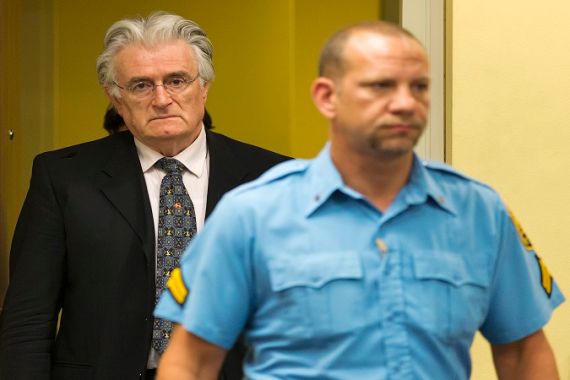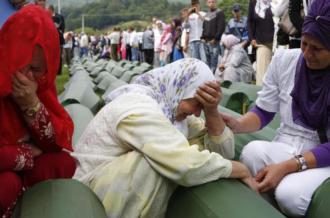Showdown at Balkan war crimes tribunal
Radovan Karadzic, a poet and psychiatrist, defended himself against genocide charges as The Hague case winds down.

The Hague, Netherlands – Radovan Karadzic walked out of the court room with his head up. The burden was lifted from the shoulders of the accused in one of the world’s most prominent war crimes trials. He had done his work. Now his fate lies in the hands of three judges.
For five years he has defended himself against genocide charges in a windowless courtroom at the United Nations’ war crimes tribunal in The Hague. Both sides presented their closing statements last week. In a showdown, the prosecutor outlined why Karadzic bears responsibility for some of the worst crimes committed in Europe since World War II; while Karadzic said he is not guilty.
Keep reading
list of 4 itemsUK starts detaining asylum seekers to be deported to Rwanda
‘We didn’t expect to find bones’: Inside one Gaza family’s nightmare
ICJ to hear Mexico’s dispute with Ecuador: All you need to know
Karadzic, leader of the Bosnian Serbs, has been charged with 11 counts of genocide, crimes against humanity, and violations of the laws or customs of war – all allegedly committed in the Balkan wars in the 1990s.
 |
| Bosnian Muslim women cry in the town of Srebrenica – scene of a massacre that killed more than 8,000 people [AP] |
Yugoslavia, a federation of six republics, was about to fall apart with different states seeking independence in the early ’90s. In Bosnia, Muslims and Croats wanted to break away, however, the Serbs under the leadership of Karadzic fought back.
By the time NATO bombings ended the war in 1995 and a peace deal was negotiated, 100,000 people had lost their lives.
“Hundreds of witnesses and pieces of evidence confirmed the policy of ethnic cleansing, in which Karadzic was a driving force,” prosecutor Alan Tieger said. At the end of his statement, he demanded the maximum: life imprisonment for Karadzic.
When Tieger condensed the five years of trial into a few sharp sentences, Karadzic – as his own defence lawyer – would barely look up. He was busy taking notes, his back straight and mind focused on the prosecutor’s words. Given the complexity of the cases and procedures before the international tribunals, defendants usually hire entire teams of lawyers.
“He is bright, engaged, charismatic and hard working,“ said Peter Robinson, Karadzic’s legal adviser. Before he went into politics, Karadzic studied medicine and practised as a psychiatrist. He wrote poems. In the courtroom, Robinson referred to the accused as “Dr Karadzic”.
|
|
| Inside Story – Croatia vs Serbia genocide claims |
Some have accused the tribunal of providing Karadzic a platform to promote his ideology and his version of events.
He was given 10 hours to address the court. Karadzic carried a pile of paper to the courtroom and arranged his notes neatly on the table in front of him.
In a short statement he accused the prosecutor of lying . Most of his remarks, however, resembled a history lecture. Karadzic discussed who gave orders to whom, and who was informed when.
The defence strategy was to show that Karadzic did not know of the massacre of 8,000 Muslim boys and men at Srebrenica.
According to international law, for the genocide charge the prosecution must prove that an accused had the intent to destroy a national, racial or religious group.
Though in practice this threshold has proven difficult to be meet. The defence argued that mere knowledge of the massacre is not sufficient to convict Karadzic of genocide. “Twenty-eight witnesses testified that Dr Karadzic was not informed of the executions in Srebrenica,“ Robinson said.
But even if he had the knowledge, this would not necessarily mean he had the genocidal intent.
“He is convinced that he knows what he did and what he intended,“ Robinson told Al Jazeera outside the courtroom in The Hague. The defence asked for an acquittal. Karadzic thinks “he should be acquitted if, in his own words, ‘this is a real court’,“ Robinson added.
Karadzic led a terror campaign.
His legal adviser said Karadzic does not feel guilt, but instead feels empathy for the people of all ethnic groups who suffered during the war in Bosnia.
“He regrets going into politics and not continuing his work as a doctor and writer but felt that it was his duty at that time,” Robinson said.
Karadzic was president of the self-proclaimed Republika Srepska – the Bosnian-Serb republic – and a supreme commander of its armed forces. The prosecutor at the International Criminal Tribunal for the Former Yugoslavia (ICTY) sees him as the ideologist behind the crimes committed against the non-Serb population. According to the prosecutor, the aim was to establish a Serbian state.
Ratko Mladic, the former head of the military who allegedly was responsible for the execution of the crimes, is the other prominent defendant at the tribunal in The Hague.
One of the charges against Karadzic relates to the massacre of Srebrenica. Other allegations refer to the siege of Sarajevo, which lasted more than three years. During that time, snipers shot at everything and everyone who moved on the streets, while artillery constantly shelled the former capital’s neighbourhoods.
“Karadzic led a terror campaign,” the prosecutor Tieger alleged.
During the trial 80,000 pages of transcripts and 10,000 exhibits were produced. This case is not only about the guilt or innocence of Karadzic.
“The trial itself is of historic importance for the evidence that was presented about the systematic nature of the crimes committed,“ said Refik Hodzic from the International Center for Transitional Justice, a New York-based international NGO.
Hodzic himself comes from the Bosnian town of Prijedor, where concentration camps existed and the largest mass grave of the war was found.
The immediate impact of the trial is almost nonexistent as the political discourse in the region does not allow for acknowledgement of the crimes, Hodzic told Al Jazeera. Instead, there will be strong revisionism and glorification of Karadzic.
“The facts established, however, will one day serve as the basis of acknowledgement and broader accountability,” said Hodzic.
Follow Benjamin Durr on Twitter: @benjaminduerr